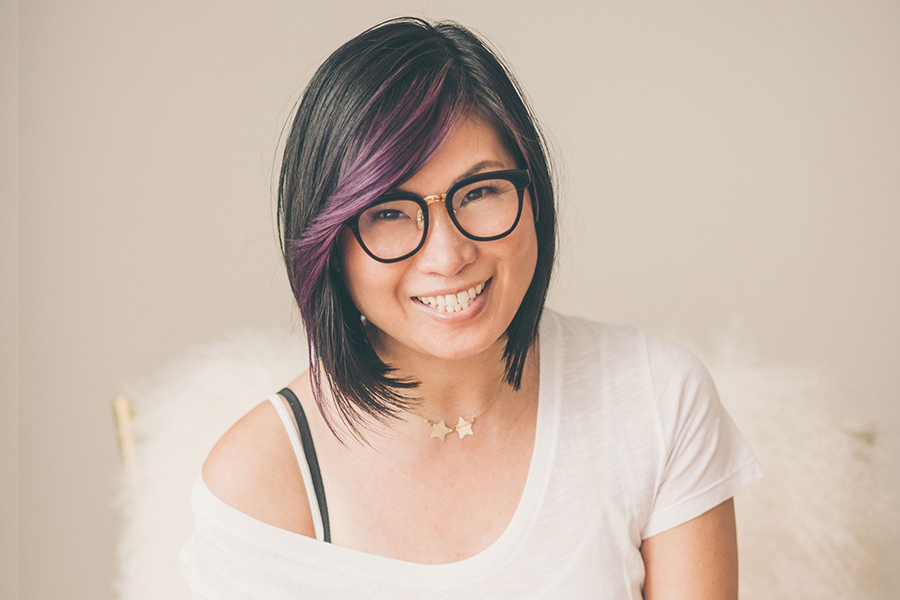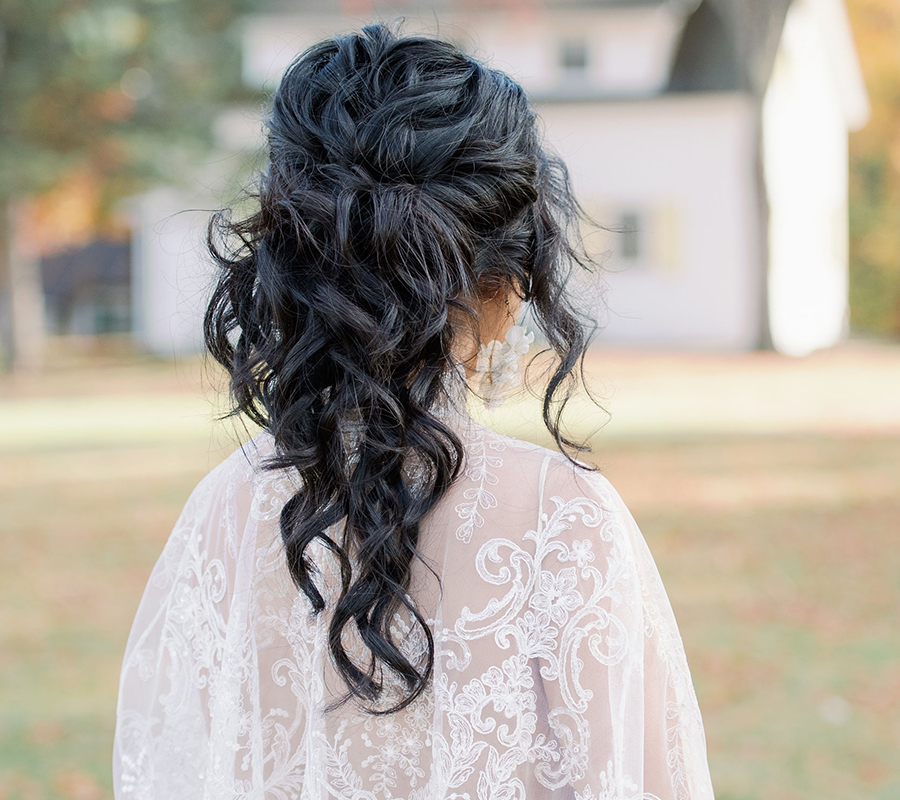Hairstylist Jenny Luu Shares the Ins and Outs of Wedding ‘Dos
Jenny Luu knows how to craft styles you’ll be swooning over long after you say “I do.”

Photo by Katherine Henry Boudoir
It’s always hard to teach yourself a new skill—but it’s even harder when you don’t have YouTube. Such was the case for Jenny Luu, a onetime IT specialist doing aesthetician and makeup-artist work on the side, when she decided to add hairstyling to her repertoire. “I’m not going to say ‘back then,’ because it would age me,” Luu says, laughing, “but there were no YouTube [tutorials] at that time. There were DVDs that you could purchase from famous hairstylists teaching you how to [create] up-dos, but it was really just all about practicing.” Eventually, with the help of styling mannequins, Luu nailed the basics and enrolled at the Toni&Guy Hairdressing Academy in Braintree. Now, years later, she runs an eponymous hair-and-makeup business in Boston focused on making brides look beautiful for their big days. “I just love all the pretty details of a wedding,” Luu says. “It’s all so exciting—if I could get married over and over again, I would!”

Photo by Lynne Reznick
How do you work with a bride to settle on a hairstyle?
Once a bride reserves her date, I send her a form so she can share her information and the wedding details. And then when she books a trial, I send her a questionnaire. I want to know everything about the wedding: the theme, the feel, and whether she [sees herself as] a classic, traditional bride or a more modern, boho one. Then I get down to what her hair texture and hair length are and have her describe her ideal hairstyle and send me inspiration photos. Then it’s time for the trial. I’ll give her information on how to prep for it, and when she comes in, I’ll recreate the look she wants. I also have an eye for when someone wants a style that isn’t going to be successful in the end—for example, if someone’s hair doesn’t hold a curl, and they pick a really curly up-do with face framing pieces, their hair is going to go straight in five minutes. [In that case], I’ll give them my honest feedback and provide them with [alternative] suggestions.
When should a bride book a hair trial?
I always suggest two to three months prior. I know it’s exciting and you just want it to happen, but if you do a trial too far in advance, your hair may be different [by your wedding date]. For example, your fringe can grow out so much that your chosen hairstyle just won’t look the same on your wedding day. Same goes for makeup; if you’re doing a trial in the winter, but your wedding’s in the summer, your skin type is going to be different.
Is it okay to change your mind after your trial?
Yes. Just send me photos [of what you want]. Because I’ve already seen brides in person, I know what their hair is like, and I have the experience to say, “Okay, this hairstyle won’t work for you, just to let you know.” But, for the most part, no bride has ever changed their hairstyle so much that I’d have to say, “That is the complete opposite of what your hair can do.”

Photo by Lynne Reznick
What are styles that work for everybody?
I really love a textured, romantic up-do—something that’s low and centered or to the side. Texture-wise, not everyone’s hair holds a curl, so I try to at least create a little wave to the hair. Even if [the style] isn’t super polished, like a looser type of up-do, it’s just perfect for everybody. I love it. It’s one of my favorites, and there’s a million ways to create it.
What kind of hair prep should a bride do before the big day?
A lot of times, it’s very minimal. I’ll just say, “Have unwashed hair for 24 hours, because squeaky-clean hair won’t cooperate when you’re getting it styled.” For a lot of hairstyles, the dirtier the hair, the better—but just slightly dirty, not to the point where it’s oily and heavy or my brides feel gross. I don’t want you to feel gross! And, at that point, I’m like, “I don’t want to touch it either!” [Laughs.] But it depends on the hair type. Sometimes all I would suggest is buying a sample size of volumizing mousse (it doesn’t matter what brand), and the day before, after they wash their hair, putting a generous amount of mousse in when it’s damp and then blow-drying it completely. That gives the hair a little bit of texture and volume, which is perfect for styling the next day.
Let’s say a bride has an August wedding. How do you keep her hair from falling apart in the New England humidity?
In that case, I’ll ask my brides to help me prep their hair [the day before]. If a bride knows that they have frizzy hair, I’ll have them use their usual products to style their hair after they wash. That sets it perfectly for me. If they wash and blow dry [instead], they’re just going to be a lion—their hair is going to poof right out and it’ll be harder for me to control! Then on the day-of, I’ll use a product like a styling cream that controls frizz and humidity-resistant hairspray.
Also, if it’s going to be hot, you definitely don’t want to wear your hair down. Because once your body heat touches your hair, [your hair frizzes]. And if you know that you’re generally someone who sweats, try to have a fan [on hand] to help yourself cool off.
How has the pandemic impacted the way you do business?
Being in the beauty industry, I have always followed proper sanitation and disinfectant protocols. With COVID-19, I’ve adjusted by adhering strictly to the CDC guidelines to ensure the safety and well-being of my brides and myself. All in-studio sessions for bridal trials have always been by appointment only. Also, I have offered complimentary skincare consultations on social media, and have been doing these with my current and past brides, as well as my wedding-industry peers virtually. I can talk about beauty and skincare all day, so I’ve been loving it.
Getting married? Start and end your wedding planning journey with Boston Weddings' guide to the best wedding vendors in the city.


